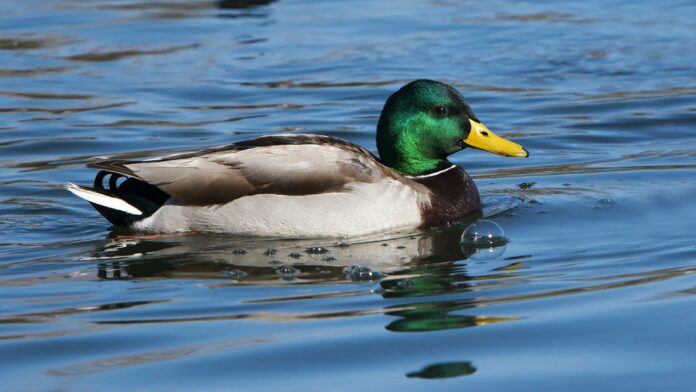How long do ducks live depends on many factors. However, an average duck’s lifespan is between 5 to 10 years, depending on the breed. For some duck breeds, the average lifespan is around 20 years.
Along with natural factors and human-controlled factors like environment, housing, and nutrition, duck lifespan can be improved.
FACT: The oldest duck that ever lived was 22 years old, named Edwina.
Which duck breed lives the longest?
The Pekin duck breed holds the record for the longest lifespan; however, many owners also report Muscovy ducks also have a long lifespan. They have an average of 8-12 years of lifespan.
Duck lifespan by breed
- Pekin – 5-10 years
- Call – 7-10 years
- Indian Runner – 8-12 years
- Khaki Campbell – 8-10 years
- Mallard- 8-10 years
How long do Pekin ducks live?
Pekin ducks are also known as white ducks and live for about 5-10 years. Some owners also report that Perkins sometimes also lives for 20 years. However, 5-10 years is a normal duck lifespan.
ALSO READ: Do Ducks Have Teeth – You Will Be Surprised to Know the Fact.
How long do call ducks live?
Call ducks are small compared to white ducks and live between 7-10 years on average.
SURPRISING FACT: Ernie, a male mallard duck, turned 21 in 2019. But a female mallard duck called Desi holds the Guinness World Record for the oldest duck.
ALSO READ: Why Do Ducks Stand on One Leg? You Will Be Amazed to Know
Factors that affect how long a duck lives?
Many factors can affect how long do ducks live in homesteads. While the environment in every homestead, there are some common areas where attention and care significantly contribute to extending duck lifespan.
Duck nutrition
In addition to feeding them the right food, it is important to know the right time to feed them. Ducks follow different feeding times depending on their development and age. Keeping this in mind, it is essential to ensure optimal nutrition.
Make sure you know what ducks eat and what is good for their health.
Ducklings need to be fed duck starters. Duck starter is a special mixture for young birds to deliver balanced nutrition. You can feed the ducks grower when they get about one month old.
As the name suggests, a grower helps provide extra nutrition to fuel the fast growth of ducks in different stages of life. After a few months, you can move the duck onto something with lower protein to ensure proper weight and healthy development.
It is essential to feed a lot of greens. The ducks will clear the weeds and keep grass trims if you have them moving around freely. This maintains their energy levels along with vitamin levels. You can also feed them clean vegetable peels now and then as an effective booster.
Ensuring adequate supply to ducks is also essential to give them a long lifespan, as this helps in easy digestion of the food they might have eaten elsewhere on their travels around the home.
The last thing is to ensure that your ducks have an adequate supply to clean water. Anyone who owns a duck knows how they like to paddle and play in the water. If you put out one bowl of water, you will have to fill it plenty of times in a day. Instead, you should supply fresh water at least twice a day and serve it in a deep enough container to let them submerge its heads completely.
FACT: 2 Unnamed Ducks pet by GLADYS BLACKBEARD are in the Guinness World Record for the oldest duck. (Source)
Duck housing
If you want your ducks to live long, provide them with a safe shelter to live in and sleep in. This part is equally important as feeding them nutritious foods. As ducks are low-maintenance birds, you need minimal focusing for your flock depending on the weather and location.
Ducks like to huddle together when sleeping, so in a single house of 12-18 square feet, 4-6 ducks can sleep. If your backyard duck house has one side opening, make sure it is facing away from the wind direction or closed if the weather is very bad.
Duck houses should be good enough to protect from predators. Foxes can dig under fencing and chew thin wood paneling, ensuring that the duck house is protected enough for the long lifespan of ducks.
Another important thing is to keep your duck house clean. Nobody likes getting rid of pet poops; however, it is necessary to prevent any diseases and pests at bay.
ALSO READ: Everything You Need to Know About Ducks.
Duck wellbeing
Like other animals, ducks need basic food, water, and shelter. As a duck owner, you are responsible for your ducks’ general wellbeing. If you allow your ducks to roam free, they will happily keep them occupied all day.
If you like to keep your ducks in a tractor or coop, make sure to give them time to move around. This will give them access to fresh grass and change the scene leading to happiness and better health.
The general well-being of ducks also extends to veterinary care. Regular flock checkups ensure ducks have a long life. You can buy natural supplements to add water and food to combat illness and disease that negatively impacts duck lifespan.
ALSO READ:
How to Keep Ducks Away From Your Pool?




